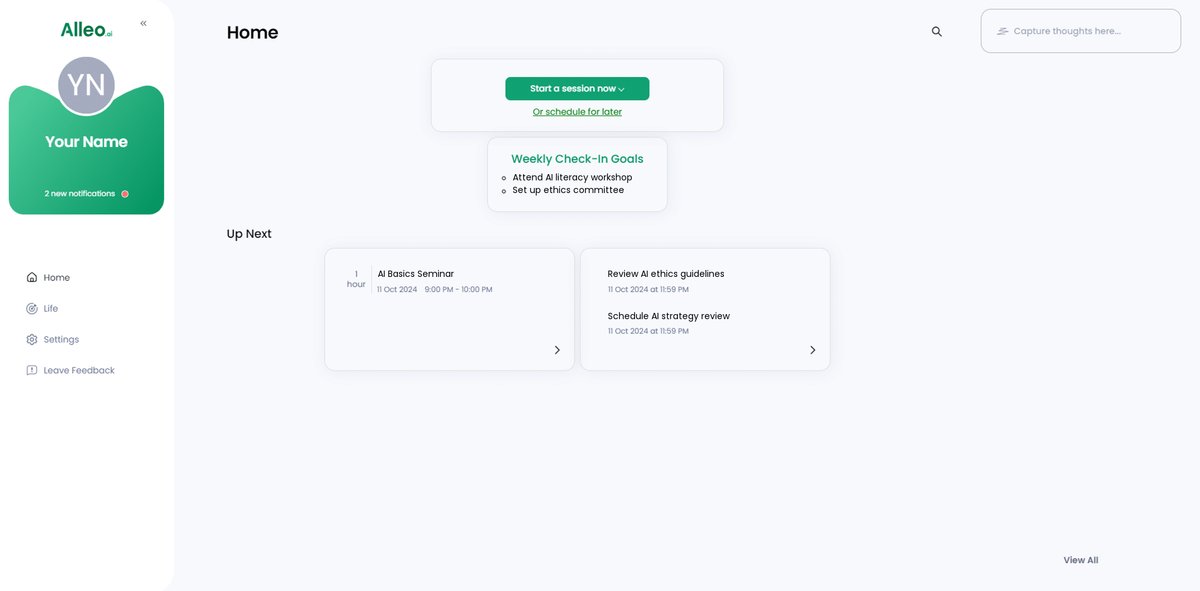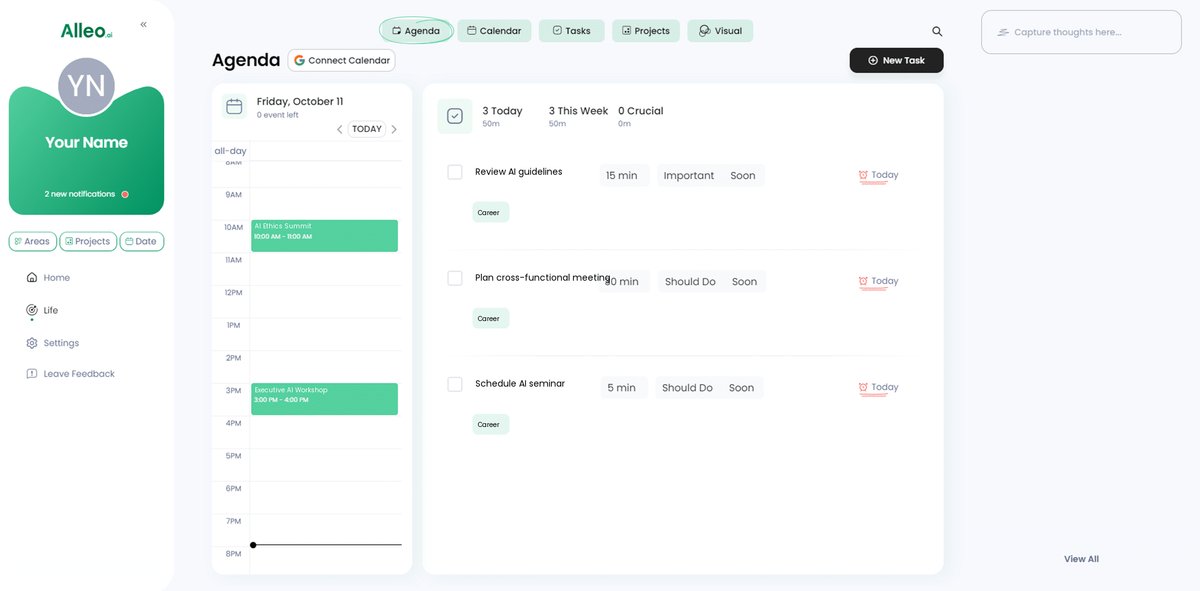4 Essential Strategies for Leaders to Adapt to AI Advancements in Business
Imagine leading your team into the future with the confidence that you can navigate the complexities of AI advancements. Implementing AI leadership adaptation strategies is crucial in this rapidly evolving landscape.
As a life coach, I’ve helped many professionals navigate these challenges. In my experience, the rapid pace of technological change can be daunting, especially when it comes to adapting leadership styles for AI integration.
In this article, you’ll discover specific AI leadership adaptation strategies to thrive. We’ll cover developing AI literacy, creating an AI ethics framework, and more. These strategies will help you balance human skills with AI capabilities and prepare for future-proofing leadership in AI-driven industries.
Let’s dive in to explore how AI-driven decision making for leaders can transform your approach to business management.

The Challenges of Adapting to AI in Leadership
Adapting to AI can feel overwhelming. Many corporate executives face rapid changes they weren’t prepared for, highlighting the need for effective AI leadership adaptation strategies.
This shift often shakes their confidence, challenging traditional leadership in the age of artificial intelligence.
For instance, several clients initially struggle with understanding AI’s impact on their roles. They find it hard to keep up with the fast pace of technological advancements, emphasizing the importance of adapting leadership styles for AI integration.
The pressure to adapt quickly can be intense, especially when considering AI-driven decision making for leaders.
Moreover, maintaining effective leadership becomes a challenge. Executives must balance learning new technologies while making strategic decisions, focusing on upskilling workforce for AI implementation.
The fear of falling behind is real, particularly in AI-driven industries.
In essence, navigating these changes is crucial. It requires resilience and a proactive approach to AI leadership adaptation strategies, including data-driven leadership strategies and balancing human skills with AI capabilities.

A Roadmap for Adapting to AI Advancements in Leadership
Overcoming this challenge requires a few key steps. Here are the main AI leadership adaptation strategies to focus on to make progress.
- Develop an AI Literacy Program for Executives: Equip leaders with essential AI knowledge through workshops and certifications, focusing on upskilling workforce for AI implementation.
- Create an AI Ethics Framework for Decision-Making: Ensure ethical considerations of AI in leadership by establishing guidelines and committees.
- Establish Cross-Functional AI Integration Teams: Promote collaboration across departments for effective AI integration and organizational change management.
- Implement AI-Driven Strategic Planning Exercises: Utilize AI tools for data-driven leadership strategies and forecasting, balancing human skills with AI capabilities.
Let’s dive into these AI leadership adaptation strategies for future-proofing leadership in AI-driven industries!
1: Develop an AI literacy program for executives
Developing an AI literacy program for executives is crucial for effective leadership in today’s fast-evolving technological landscape, forming a key component of AI leadership adaptation strategies.
Actionable Steps:
- Host AI Workshops and Seminars: Organize quarterly workshops to educate executives on the latest AI trends and technologies, focusing on AI in business management.
- Create a Learning Path with Certifications: Develop a structured learning path with certifications in AI literacy to track progress and ensure comprehensive understanding of leadership in the age of artificial intelligence.
- Foster a Mentorship Program: Pair executives with AI experts for one-on-one mentoring sessions to personalize their learning experience and explore adapting leadership styles for AI integration.
Explanation:
These steps matter because understanding AI equips leaders with the knowledge to make informed decisions, fostering innovation and competitiveness. For instance, a structured learning path ensures continuous development and up-to-date knowledge, essential for AI-driven decision making for leaders.
According to AI literacy, having detailed AI knowledge allows executives to leverage AI tools effectively in their strategic planning and decision-making processes, crucial for balancing human skills with AI capabilities.
Key benefits of AI literacy for executives:
- Enhanced decision-making capabilities through data-driven leadership strategies
- Improved ability to identify AI opportunities and manage organizational change
- Better risk assessment in AI implementations, including ethical considerations of AI in leadership
These initiatives will help you stay ahead and lead with confidence, future-proofing leadership in AI-driven industries.

2: Create an AI ethics framework for decision-making
Creating an AI ethics framework is essential for ensuring responsible AI use in decision-making processes, which is a key component of AI leadership adaptation strategies.
Actionable Steps:
- Establish an AI Ethics Committee: Form a committee to draft and oversee the AI ethics framework within the organization, addressing ethical considerations of AI in leadership.
- Conduct Ethical Impact Assessments: Implement regular assessments to evaluate the ethical implications of AI projects and ensure alignment with company values, supporting AI-driven decision making for leaders.
- Develop Ethical AI Guidelines: Create comprehensive guidelines that outline ethical considerations for AI use and decision-making processes, contributing to leadership in the age of artificial intelligence.
Explanation:
These steps matter because they help maintain trust and transparency in AI implementation. For instance, conducting regular assessments ensures that AI projects align with company values and support adapting leadership styles for AI integration.
Establishing an AI ethics framework promotes responsible AI use and addresses ethical concerns. According to Seattle University, incorporating ethical considerations in AI is crucial for organizational success in the digital age, which is essential for future-proofing leadership in AI-driven industries.
This approach will help you lead with integrity and make informed decisions, balancing human skills with AI capabilities in business management.

3: Establish cross-functional AI integration teams
Establishing cross-functional AI integration teams is crucial for effective AI implementation in your organization, forming a key part of AI leadership adaptation strategies.
Actionable Steps:
- Form Multidisciplinary Teams: Assemble teams with members from various departments (IT, HR, marketing, etc.) to ensure diverse perspectives in AI projects and support data-driven leadership strategies.
- Conduct Regular Team Workshops: Schedule monthly workshops to discuss progress, share insights, and address challenges faced by the AI integration teams, focusing on adapting leadership styles for AI integration.
- Implement Collaboration Tools: Utilize advanced collaboration tools and platforms to facilitate seamless communication and project management across teams, enhancing AI in business management.
Explanation:
These steps matter because they promote diverse input and foster innovation. Regular workshops ensure continuous progress and problem-solving, which is essential for leadership in the age of artificial intelligence.
According to SHRM, cross-functional collaboration is key to tackling complex challenges and creating agile, resilient workforces. This approach will help you leverage varied expertise and drive successful AI integration, balancing human skills with AI capabilities.
Benefits of cross-functional AI teams:
- Increased innovation through diverse perspectives
- Improved problem-solving capabilities
- Enhanced organizational adaptability
This collaborative strategy will enhance your organization’s adaptability and innovation, supporting AI-driven decision making for leaders and future-proofing leadership in AI-driven industries.

4: Implement AI-driven strategic planning exercises
Incorporating AI into strategic planning is vital for staying competitive in today’s fast-paced business environment. AI leadership adaptation strategies are crucial for success in this rapidly evolving landscape.
Actionable Steps:
- Run AI Simulation Scenarios: Use AI tools to simulate various business scenarios and outcomes, helping you make data-driven strategic decisions and adapt leadership styles for AI integration.
- Integrate AI Forecasting Tools: Implement AI-powered forecasting tools to predict market trends and inform your strategic planning process, enhancing AI-driven decision making for leaders.
- Schedule AI Strategy Review Meetings: Hold bi-annual meetings to assess the effectiveness of AI-driven plans and adjust strategies as needed, focusing on AI and organizational change management.
Explanation:
These steps matter because they enable proactive and informed decision-making. AI simulations and forecasting tools provide valuable insights that can improve strategic outcomes, supporting leadership in the age of artificial intelligence.
According to MIT Sloan, using AI in strategic planning enhances organizational adaptability and competitiveness. Regular strategy review meetings ensure that your AI leadership adaptation strategies remain relevant and effective.
Key components of AI-driven strategic planning:
- Data-driven scenario analysis for future-proofing leadership in AI-driven industries
- Predictive market trend forecasting using AI in business management
- Adaptive strategy formulation balancing human skills with AI capabilities
This approach will empower you to lead your organization confidently into the future, leveraging AI leadership adaptation strategies for success.

Partner with Alleo on Your AI Journey
We’ve explored the challenges of adapting to AI advancements in leadership. Did you know you can work directly with Alleo to make this AI leadership adaptation journey easier and faster?
Setting up an account with Alleo is simple. First, create a personalized plan tailored to your specific AI challenges, focusing on leadership in the age of artificial intelligence.
Alleo’s coach will guide you through mastering AI skills and adapting leadership styles for AI integration, providing full coaching sessions similar to a human coach. The coach will follow up on your progress, handle changes, and keep you accountable via text and push notifications, helping you with AI-driven decision making for leaders.
Ready to get started for free? Let me show you how to begin your AI leadership adaptation strategies!
Step 1: Log In or Create Your Account
To begin your AI leadership journey, log in to your existing Alleo account or create a new one in just a few clicks to access personalized coaching and support.

Step 2: Choose Your AI Leadership Focus
Select “Setting and achieving personal or professional goals” to align your AI leadership journey with the strategies discussed in the article. This focus will help you develop the skills needed to confidently navigate AI advancements in your role.

Step 3: Select “Career” as Your Focus Area
Choose “Career” as your focus area to align with the AI leadership challenges discussed in the article, allowing Alleo’s AI coach to provide targeted guidance on developing AI literacy, creating ethics frameworks, and implementing AI-driven strategies in your professional life.

Step 4: Starting a Coaching Session
Begin your AI leadership journey with an intake session to set up your personalized plan, allowing Alleo’s coach to guide you through mastering AI skills and navigating the challenges discussed in the article.

Step 5: Viewing and managing goals after the session
After your coaching session, open the Alleo app to find your discussed goals conveniently displayed on the home page, allowing you to easily track and manage your progress toward AI leadership adaptation.

Step 6: Adding Events to Your Calendar or App
Track your progress in solving AI challenges by adding key milestones and tasks to your calendar or app, allowing you to stay organized and accountable as you work through your personalized AI adaptation plan with Alleo’s guidance.

Embrace the Future with Confidence
As you consider these AI leadership adaptation strategies, remember that adapting to AI is a journey, not a sprint.
We’ve covered essential steps like developing AI literacy, creating an ethics framework for AI in business management, and fostering cross-functional teams for adapting leadership styles for AI integration.
Each of these steps helps you lead confidently in a rapidly changing environment, balancing human skills with AI capabilities.
And don’t forget, Alleo can guide you every step of the way in leadership in the age of artificial intelligence.
I know it can be daunting, but you’re not alone in this journey of AI-driven organizational change management.
With the right tools and support, you can navigate these changes successfully and implement data-driven leadership strategies.
So take the first step towards future-proofing leadership in AI-driven industries.
Start your free trial with Alleo today and lead your team into the future with confidence, mastering AI-driven decision making for leaders.